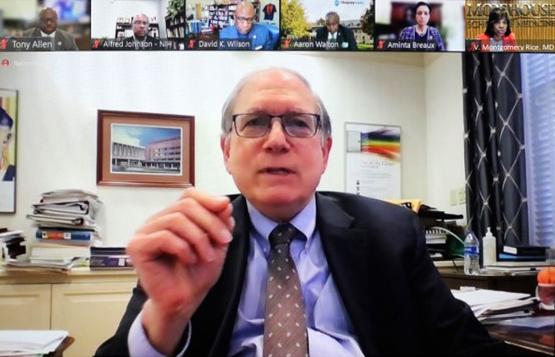Tabak Leads Discussion on Biomedical Research Contracts with HBCUs

NIH acting director Dr. Lawrence Tabak opened a conversation about the agency’s engagement with Historically Black Colleges and Universities (HBCUs) during a recent virtual roundtable with their presidents and chancellors.
Thirteen HBCUs participated in the roughly 90-minute discussion hosted by the Path to Excellence and Innovation (PEI) Initiative, which is administered by the NIH Small Business Program Office (SBPO). The initiative provides HBCUs with resources for building contracting capacity and infrastructure by specifically targeting acquisition opportunities with a focus on biomedical research and other activities central to the NIH mission. The desired outcome is an increase in the number of contracts awarded to HBCUs.
Tabak said NIH senior leadership gathering with presidents of HBCUs was a “singularly unique event” that has never happened during his 22-year tenure with the agency.
NIH’s 27 institutes and centers obligate approximately $8 billion annually through contract awards. However, less than 1 percent of those contracts are awarded to HBCUs.
“Equity is not achieved by awarding contracts only to a handful of HBCUs,” Tabak said. “Consequently, NIH has expanded the PEI to build relationships with 21 colleges and universities and 42 small businesses.”
Tabak told the group that it is essential for the agency to regularly engage HBCU senior leadership through discussions on strategies for improving perceived barriers these institutions encounter when working with federal agencies. Such conversations also should address how HBCUs can achieve milestones in the NIH acquisition arena.
Also participating in the PEI HBCU Presidents Roundtable were Dr. Alfred Johnson, NIH deputy director for management; Diane Frasier, head of the contracting activity and director of the Office of Acquisition and Logistics Management; and Annette V. Owens-Scarboro, SBPO program manager and HBCU coordinator. Former NICHD deputy director Dr. Yvonne T. Maddox moderated the event.
During the conversation, Delaware State University president Dr. Tony Allen, who also serves as chair of President Biden’s board of advisors on HBCUs, shared information on Presidential Executive Order 14041—Advancing Educational Equity, Excellence, and Economic Opportunity Through Historically Black Colleges and Universities—and its relationship to the PEI initiative.
One of Allen’s priorities is advocating for investment in infrastructure, particularly research facilities on HBCU campuses. He noted that there is a strong desire to see HBCUs obtain R1 Carnegie classification and that HBCU presidents are eager to see their institutions achieve this highest rating.
“I can say that President [Biden] himself has talked specifically about wanting more than one HBCU during his tenure to become an R1 school,” said Allen. “So, we have the administration’s support in that way.”
HBCU presidents in the meeting committed to continued participation in the cohort because of their interest in contributing to biomedical research at NIH. They also expressed their appreciation for the infrastructure support PEI provides.
